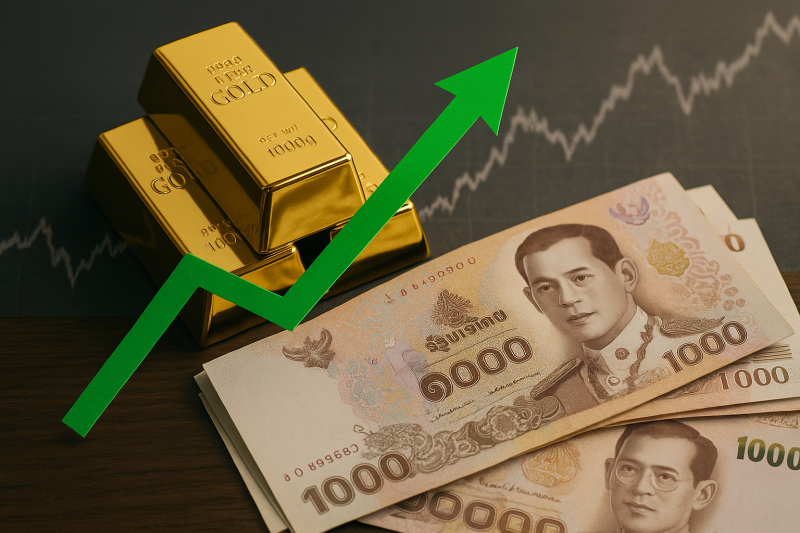Thailand’s currency is on track for its biggest annual gain in six years against the US dollar.
A development that is raising new concerns for Prime Minister Anutin Charnvirakul’s government.
The baht’s rally has been fuelled not by rapid economic growth, but by a combination of gold flows, shifting investor sentiment, and changes in global trade.
While exports and tourism face setbacks, the strength of the currency has surprised markets, with the baht hitting a four-year high against the dollar in September and already climbing 5% since US tariffs were announced earlier this year.
Gold linked to baht surge
Gold has been at the heart of the baht’s appreciation, as per a Bloomberg report.
Thailand is one of the world’s most active gold markets, and demand for bullion has surged alongside global prices.
Gold exports rose nearly 70% to 254 billion baht in the first seven months of 2025, contributing significantly to dollar inflows.
At one point this year, the 30-day correlation between gold and the baht climbed to 0.88, the highest in almost three years.
Gold plays both cultural and financial roles in Thailand, used for savings, religious offerings, and wealth transfer.
When gold prices rise globally, Thai traders often sell their holdings and convert proceeds into the local currency, strengthening the baht further.
Household demand for gold rose 13% in 2024, marking the fourth consecutive year of growth, while global investors shifted away from US assets into bullion, reinforcing the metal’s impact on Thailand’s currency.
Trade shifts and investment flows
The baht has also been supported by trade realignments following tariffs imposed by the US.
President Donald Trump’s 19% duty on Thai imports hurt exporters but also redirected investment into Thailand.
Companies seeking to avoid a 30% tariff on Chinese goods expanded operations in Thailand, where new investment proposals reached $32.5 billion in the first half of 2025, a 139% rise from the same period last year.
Projects included digital, electrical, and rail infrastructure, strengthening the country’s current account surplus, which stood at $13 billion by August, exceeding the Bank of Thailand’s full-year forecast.
At the same time, the baht has benefited from the weakness of the US dollar.
Concerns about the impact of trade wars on the US economy and the Federal Reserve’s interest-rate cuts triggered capital outflows from US assets.
Investors moved funds into Asia, with Thailand emerging as a recipient thanks to its surplus and relative stability.
Pressure on exports and tourism
The baht’s strength is creating new challenges for Thailand’s economy.
A stronger currency makes exports more expensive abroad, putting pressure on a sector already hit by US tariffs.
In August, export growth slowed to its weakest pace in nearly a year, according to the Commerce Ministry.
Tourism, which accounts for a large share of economic output, is also feeling the strain.
Between January and late September, foreign tourist arrivals fell 7.5% compared with the same period in 2024.
Chinese visitors, once Thailand’s largest source of inbound tourism, are choosing cheaper destinations such as Vietnam and Malaysia, a trend intensified by safety concerns following a kidnapping incident earlier this year.
While the stronger baht lowers the cost of imported goods such as fuel and electronics, providing some relief to households, the negative impact on exports and tourism outweighs these benefits.
This imbalance threatens to slow down recovery in an economy already facing high household debt and sluggish domestic consumption.
Government and central bank response
The government has signalled urgency in tackling the baht’s rise.
Fitch Ratings cut Thailand’s credit outlook to negative in late September, citing weak growth and prolonged political uncertainty.
Moody’s had already issued a similar downgrade, raising pressure on the administration to respond.
So far, the Bank of Thailand has intervened only to smooth volatility, lifting foreign exchange reserves to a record $272.3 billion, equivalent to about half of GDP.
More aggressive moves risk US accusations of currency manipulation, which could lead to sanctions.
Officials are exploring ways to reduce the baht’s sensitivity to gold flows.
One measure under discussion is promoting gold trades settled in US dollars through online platforms, reducing the direct conversion into baht.
Another option is a tax on physical gold trading, though this would require extensive consultation.
After the announcement of a working group to address the baht’s strength in September, the currency weakened slightly, dropping 2% against the dollar, while the gold-baht correlation slipped to 0.5.
However, balancing investor confidence, trade competitiveness, and political stability remains a complex task for Thailand’s policymakers.
The post Why the Thai baht’s climb against US dollar is concerning for the local economy appeared first on Invezz


